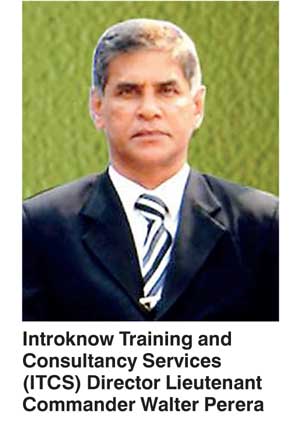Friday Feb 20, 2026
Friday Feb 20, 2026
Monday, 21 November 2016 00:01 - - {{hitsCtrl.values.hits}}
 By Harsha Udayakantha Peiris
By Harsha Udayakantha Peiris
Provision of continued training and consultancy for the development of small and medium scale enterprises as well as large organisations is key to prosper. It provides to share international collaborative knowledge and best practices and uplift the knowledge from percent level to the required level toward reaching the vision of any successful business.
“Unfortunately, the majority of small and medium enterprises especially in Sri Lanka are not steered on a reachable vision. Even if the visions are set by those companies, they are not the ideal images of their future and the accelerators such as leadership, employees, processes, technology and required level of knowledge are not in line with the vision,” says Introknow Training and Consultancy Services (ITCS) Director Lieutenant Commander Walter Perera.
ITCS is a unique institution established for the provision of training and consultancy for the development of small and medium scale entrepreneurs and large organisations in Sri Lanka and other countries. The institution has been established after a comprehensive analysis carried out by the experts and the professionals who count rich experiences in the products and services businesses on both international and local platforms.
“Majority of SMEs have not identified the operational standards, allocation processes and their presidencies. As a result, companies do not have an effective network of Key Performance Indicators which are connected to each other. At the same time, even large organisations cannot achieve the expected output of the growth and the profitability despite the large amount of re-investment on strategies, systems, training and infrastructure,” Perera says.
As an effective and innovative measure to overcome such obstacles in sustaining as competitive yet profitable partners in business, ITC has introduced the best practices of Lean Management procedures for success. The implementations of the system is carried out on the observations of key accelerators of the organisation and main gaps are identified, properly addressed and developed with the commitment of the managements of SMEs and large companies.
The concept of Lean Management involves the systematic elimination of all types of waste in production and service related processes.
Lean also involves the concept of continuous production flow to satisfy customer demand by minimising production and service lead time. The objective is that, the needed items and the services to be at the right place at the right time in right quantity and quality. The process also requires identifying and eliminating activities that do not add value to the process of design, production, logistic and customer relations. The lean concept for industries was originally developed by the TOYOTA Motors (TPS) Japan for its production system to regulate its complicated operations.
“With our latest initiatives on lean, we hope to bring down the new knowledge and best practices on international platforms to share amongst business entrepreneurs who deserve it, to expand their business and HR capacities. Today, implementing this initiative has been identified as a national requirement. The right knowledge we share as new knowledge is what makes a positive difference in any organisation that leads to create more success stories.
“At the same time, we should not forget that lean is an existing knowledge but yet the international practices are new. We have to emphasise the practical application of lean, both locally as well as internationally in order to effectively share its best practices.
“Lean means continues improvement whilst entrepreneur improves. It improves the gain of utilisation of material, labour, power, energy and capital. Here, hidden waste can be successfully identified in all segments and are addressed effectively to remove bottle necks and goose necks in the production or service process path. It also improves minimising waiting time and improves that the product or the service is available at the right time, right place in right quantity for the next to perform his task or duty. To the end customer or consumer, time in delivery and the quality of product or service are the most important factors,” says Perera.
According to ITCS, success in business context is nothing but the relationship. It is not only the relationship between internal role players and the end customer but also the fair play and teamwork between units, sections, departments and the management to run the mechanism towards achieving successful business and sales goals. Therefore, the practice of Lean Management helps top level managers, executives as well as the CEOs to understand how to set up corporate marketing plans and improve sales by educating the participants on the principles and concepts of corporate marketing planning. Customer care training programs in this regard, will cover customer service skills, building customer loyalty, creating effective first impressions, managing customer expectations as well as handling difficult customers.
“As an institution that works towards the development of national socio-economic prosperity of Sri Lanka, we are fully abided by the national priorities extended by the Government to develop MSMEs, SMEs as well as large scale enterprises.
We believe that bargain in industries is right to match the competition but partnering is pivotal to sustain as successful businesses. We have apparently seen people re-invest to bring tangible technology to enhance revenue or growth. What we do here is enhancing intangible technology to the existing technology where businesses could gain the enhancement of capital. So, lean applied in this regard is such a tool, that to say, if utilised effectively, it enhances the overall productivity of any business. If any business is lean proficient and lean protected, that needs not to minimise cost by cutting wages or welfare of the employees as it fruitfully and effectively identifies the hidden waste and addresses effectively. Therefore, training on Lean Management is Key to develop Sri Lanka as a strong economy in the region,” Lieutenant Commander Walter Perera says.